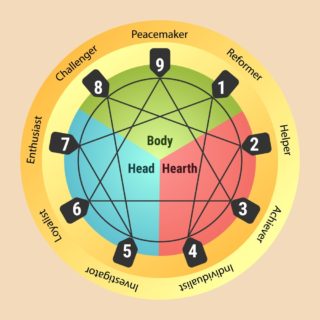
First, it’s not exactly new. Its origins date back many moons ago according to the detailed history recorded by The Enneagram Institute. But what is new is the explosion of interest in this personality typing tool.
Why has Enneagram reached trending status now? The answer to that question falls neatly into two parts.
- An interest in and concern with the concepts of self-care, emotional well-being, while gaining a deeper understanding of oneself, has been on the rise for several years.
- The upside-down-world that has gripped our daily lives since mid-March, in the form of the coronavirus pandemic, has resulted in an explosion of exploration and soul searching and personal reflection.
A perfect storm, er, the scenario for the ramped-up interest in Enneagram. But don’t take my word for it. A quick internet search for “Enneagram and the pandemic” will deliver pages of results.
“The Enneagram offers significant depth and multiple layers for personal discovery, exploration, and growth that I have not found in other tools,” says Natalie Pickering, Ph.D., psychologist and coach at High Places Coaching & Consulting.
Until quite recently, the most common way to gain insight into the personality—the individual differences in characteristic patterns of thinking, feeling, and behaving—was to utilize often quite lengthy questionnaires. But a major flaw in this process surfaced, when it was noted a person could “fudge,” choosing the answer he/she felt to be the “right” or more desirable response.
Enter a more accurate tool via the world of personality psychology, the scientific discipline that studies the personality system, seeking to understand a person’s major psychological patterns and how those patterns are expressed in an individual’s life.
Researchers have determined that regardless of gender, age, or nationality, every person comprises five fundamental traits.
- Openness
- Conscientiousness
- Extroversion
- Agreeableness
- Neuroticism
Personality tests show participants whether they are high, low, or in the middle for each of these qualities and how those traits meld or clash with each other.
So, what does all of this have to do with marketing? Plenty.
As Christopher Graves and Sandra Matz explain, “No marketer wants to present a message that is off-key or even irrelevant; personality science offers the chance to empathize with individuals, and engage them with the message, advertisement, or content in a way that is more likely to resonate with them. The theory is that if you can match the tone and framing of the communications or marketing with the personality profiles and thinking styles of potential customers, patients, voters, or those whose behavior you’d like to change, you can boost effectiveness.”
To learn more about this science, check out Maryville University’s “10 Psychological Tactics for Impactful Marketing.” And, if you haven’t done so already, delve into discovering more about yourself by completing the Enneagram Test.
Because the first rule of marketing is to know the customer, ASJ Partners invests as much time as is necessary to discover the unique needs of each of our staffing industry clients. Our six-step process begins with a consultative approach to assist us in understanding your goals. What are you waiting for? Contact our team today.




